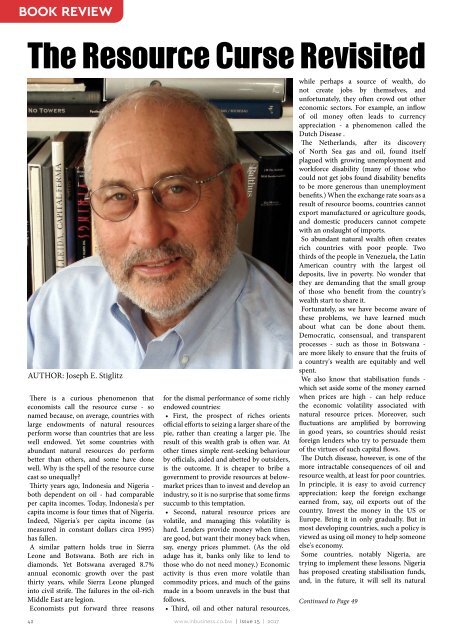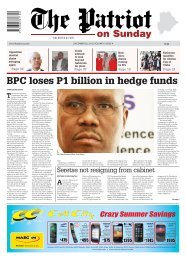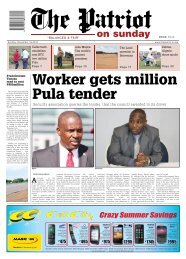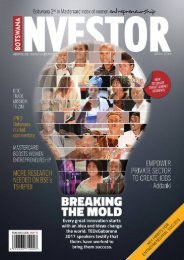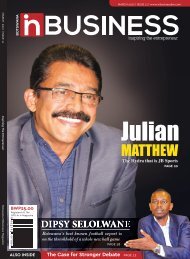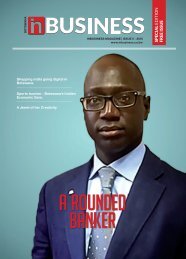inBUSINESS Issue 15
Create successful ePaper yourself
Turn your PDF publications into a flip-book with our unique Google optimized e-Paper software.
BOOK REVIEW<br />
The Resource Curse Revisited<br />
AUTHOR: Joseph E. Stiglitz<br />
There is a curious phenomenon that<br />
economists call the resource curse - so<br />
named because, on average, countries with<br />
large endowments of natural resources<br />
perform worse than countries that are less<br />
well endowed. Yet some countries with<br />
abundant natural resources do perform<br />
better than others, and some have done<br />
well. Why is the spell of the resource curse<br />
cast so unequally?<br />
Thirty years ago, Indonesia and Nigeria -<br />
both dependent on oil - had comparable<br />
per capita incomes. Today, Indonesia's per<br />
capita income is four times that of Nigeria.<br />
Indeed, Nigeria's per capita income (as<br />
measured in constant dollars circa 1995)<br />
has fallen.<br />
A similar pattern holds true in Sierra<br />
Leone and Botswana. Both are rich in<br />
diamonds. Yet Botswana averaged 8.7%<br />
annual economic growth over the past<br />
thirty years, while Sierra Leone plunged<br />
into civil strife. The failures in the oil-rich<br />
Middle East are legion.<br />
Economists put forward three reasons<br />
42<br />
for the dismal performance of some richly<br />
endowed countries:<br />
• First, the prospect of riches orients<br />
official efforts to seizing a larger share of the<br />
pie, rather than creating a larger pie. The<br />
result of this wealth grab is often war. At<br />
other times simple rent-seeking behaviour<br />
by officials, aided and abetted by outsiders,<br />
is the outcome. It is cheaper to bribe a<br />
government to provide resources at belowmarket<br />
prices than to invest and develop an<br />
industry, so it is no surprise that some firms<br />
succumb to this temptation.<br />
• Second, natural resource prices are<br />
volatile, and managing this volatility is<br />
hard. Lenders provide money when times<br />
are good, but want their money back when,<br />
say, energy prices plummet. (As the old<br />
adage has it, banks only like to lend to<br />
those who do not need money.) Economic<br />
activity is thus even more volatile than<br />
commodity prices, and much of the gains<br />
made in a boom unravels in the bust that<br />
follows.<br />
• Third, oil and other natural resources,<br />
www.inbusiness.co.bw | <strong>Issue</strong> <strong>15</strong> | 2017<br />
while perhaps a source of wealth, do<br />
not create jobs by themselves, and<br />
unfortunately, they often crowd out other<br />
economic sectors. For example, an inflow<br />
of oil money often leads to currency<br />
appreciation - a phenomenon called the<br />
Dutch Disease .<br />
The Netherlands, after its discovery<br />
of North Sea gas and oil, found itself<br />
plagued with growing unemployment and<br />
workforce disability (many of those who<br />
could not get jobs found disability benefits<br />
to be more generous than unemployment<br />
benefits.) When the exchange rate soars as a<br />
result of resource booms, countries cannot<br />
export manufactured or agriculture goods,<br />
and domestic producers cannot compete<br />
with an onslaught of imports.<br />
So abundant natural wealth often creates<br />
rich countries with poor people. Two<br />
thirds of the people in Venezuela, the Latin<br />
American country with the largest oil<br />
deposits, live in poverty. No wonder that<br />
they are demanding that the small group<br />
of those who benefit from the country's<br />
wealth start to share it.<br />
Fortunately, as we have become aware of<br />
these problems, we have learned much<br />
about what can be done about them.<br />
Democratic, consensual, and transparent<br />
processes - such as those in Botswana -<br />
are more likely to ensure that the fruits of<br />
a country's wealth are equitably and well<br />
spent.<br />
We also know that stabilisation funds -<br />
which set aside some of the money earned<br />
when prices are high - can help reduce<br />
the economic volatility associated with<br />
natural resource prices. Moreover, such<br />
fluctuations are amplified by borrowing<br />
in good years, so countries should resist<br />
foreign lenders who try to persuade them<br />
of the virtues of such capital flows.<br />
The Dutch disease, however, is one of the<br />
more intractable consequences of oil and<br />
resource wealth, at least for poor countries.<br />
In principle, it is easy to avoid currency<br />
appreciation: keep the foreign exchange<br />
earned from, say, oil exports out of the<br />
country. Invest the money in the US or<br />
Europe. Bring it in only gradually. But in<br />
most developing countries, such a policy is<br />
viewed as using oil money to help someone<br />
else's economy.<br />
Some countries, notably Nigeria, are<br />
trying to implement these lessons. Nigeria<br />
has proposed creating stabilisation funds,<br />
and, in the future, it will sell its natural<br />
Continued to Page 49


